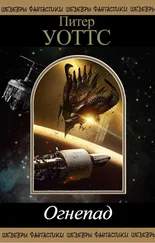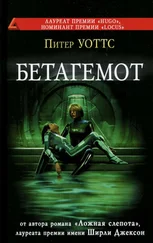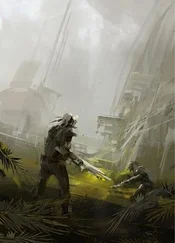“Seriously. How do we know when the mission’s over?”
“Why would you want it to be over ?” Vik wondered.
“When we receive the callback sequence,” Chimp said. Which had made perfect sense back when we were young and freshly minted and shiny new. The Diaspora reflected the m ost advanced tech the twenty-second century could offer—but there’d be a twenty-third century, and a twenty-fourth. Our descendants would have wands and amulets unimaginable on the day we launched. Everyone knew it was only a matter of time before Eri and her sisters fell into obsolescence, before we were called back to a better home and some new generation took over. And if that didn’t happen, it only meant that Home hadn’t got better after all—that Mission Control had died without issue, along with the rest of the species.
Either way, we were better off here.
Still.
“I dunno, Chi mp. It’s been a while. What if there is no callback? Could we just, you know, call it off from this end?”
It took a moment for him to answer. “There’s no other definitive end state, Sunday. The closest I could come would be an extinction event.”
“Our extinction?”
“Humanity’s extinction.”
Nobody said anything for a bit.
“So, um. How would you establish that?” Viktor asked eventually.
“And how do you tell the difference between going extinct and just, you know, changing into something else ?” I added.
“I’m not certain in either case. I’d have to assess the evidence on a case-by-case basis.”
I frowned. “You don’t have protocols for that kind of thing?”
“I do. But they’re only triggered in context.”
“Funny you don’t have access to them otherwise,” Viktor remarked.
“There’s no need for them otherwise.”
We weren’t fooled. It was Easter Island all over again: a mission set in motion by control freaks, terrified that the meat would eventually screw things up. Limiting our degrees of freedom was their sacred charge.
Looking past the prehistoric politics, though, the bottom line was clear enough: there was no finish line. Far as the Chimp was concerned, we could keep going forever.
Maybe that should’ve bothered me more. It’s not that I objected to a life sentence; we’d known from the age of seven what we were in for. But that sentence had been voluntary. Joyful, even. We were exiles by our own consent, collaborators in the ultimate adventure.
Maybe that was the point. Maybe getting my nose rubbed in the obvious—that our consent was a joke, that the Diaspora had no Off switch—should have burned more than it did. At the time I wondered if they’d deliberately engineered us to be indifferent to future consequences.
Until I realized they wouldn’t have had to.
/ / / / /
Dhanyata Wali did the honors, installed the Pretender during a build deep in the bow shock over TriAnd. I wasn’t on deck, so I never got the details first-hand. (You can’t exactly throw a party to celebrate your tactical victories when the enemy has eyes on your rec room, although there may have been some rejoicing down in the Glade. Assuming Lian was still capable of rejoicing by then.)
The ironic thing was, it wasn’t even our idea. We stole it from the Chimp—and even the Chimp was just using the same old traffic-allocation strategies networks have been using since the dawn of the computer age. Ping your nodes, get them to ping each other, provoke a web of call-and-response so you always know which one is fastest on the draw. The winner becomes Ghost of Chimp Yet to Come: ready to jump in and take the reins when Chimp Present retires, when its current node gets old or breaks or just ends up too far from the action.
Which is where the Ghost of Chimp Past comes in.
Kaden had tracked a hypervisor to the heavy zone a few builds before. Se hadn’t quite nailed it down before the Chimp jumped away again but a little poking around turned up the vacated node behind a service panel, next to one of the secondary trunks. Kaden told Dhanyata; Dhanyata swapped it out for a dummy that would pass for the real thing so long as the Chimp didn’t ask it too many questions while we were hacking the original.
The first hack coaxed the node into subtracting some trifling amount from its latency scores; a little white lie to make it appear to be the fastest player in the game, guaranteed next in the line of succession.
The second hack taught it to be a little more trusting of human judgment.
That wasn’t as complicated as you might think. The Chimp was already wired to follow our commands; it’s just that whenever we issued one, it ran scenarios to predict the impact of that command on the mission. It was a formality most of the time, a millisecond delay between order and implementation. The system only told us to fuck off if any flags went up.
We didn’t even have to touch the lower-level code, just bypass that one detour. Insert a checksum after the jump that matched the one before, and voila: a master enslaved, in our pocket from the moment of its ascension. They tell me it went off without a hitch.
Then it was just a matter of tracking the Chimp to its current digs, and trashing the place.
“Aki Sok.” Lian’s eyes were sad and kind. “What are we going to do with you.”
We all knew, of course. There were only two things we could do, and Lian had already ruled one of them out; she was in this to save lives.
Aki, nodding. Acquiescent. Terrified. “I thought I could—I’m sorry …”
The smuggling of clandestine components under watchful machine eyes. The passing of mission-critical intel. The possibility of betrayal. The fear of discovery.
Turns out Aki just wasn’t up to it.
Now the coffin gaped at her feet in this tiny temporary clearing where the black forest squirmed and rustled on all sides. Eventually the rest of us would leave, and the lights would go out. The repellant pheromones we’d sprayed across the rocks would degrade; the forest would close in, hungry for the infinitesimal heat trace Aki’s hibernaculum would bleed out for all the long dark ages of its operation. Even if the Chimp were to sacrifice another bot to the Glade—even if its sock puppets made it in this far—it would not see her. Aki would vanish under vines and darkness and sleep away the aeons until the overlord was overthrown.
It’s not like we could return her to active service, even if we did trust her to keep her mouth shut. She’d been listed as dead for a good twenty gigasecs.
I tried to offer some comfort. “Hey, by the time you wake up we’ll be running our own builds.” And she smiled weakly, and climbed inside, and whispered—
— “you just better fucking win” —
—as the lid came down.
Lian looked around as Aki’s vitals began to subside: at me, at Ellin, at Dao (who had, ultimately, come around after all). “We can’t afford this, people. We can’t afford these kinds of fuck-ups.”
“Two misses in a thousand centuries isn’t so bad,” Ellin said. “At least this one was an easy fix.”
Not like Stoller, she meant.
“One’s all it takes to deprecate the lot of us.” Lian shook her head. “I need to be a way better judge of character.”
“We’re mutineers,” Dao pointed out. “It’s a risk, Li, it’s always gonna be a risk. We’re never gonna eliminate it, we just gotta keep it—manageable. And know that it’s worth it.”
Suck up , I thought.
He was right, though. Lian had never been careless with her trust, and the plan didn’t depend on heavy numbers. We were maybe thirty strong now, and Lian had chosen us carefully: keep it small, keep it secret, keep it close. Keep potential breaches to a minimum.
Читать дальше










![Питер Уоттс - Водоворот. Запальник. Малак [litres]](/books/420290/piter-uotts-vodovorot-zapalnik-malak-litres-thumb.webp)